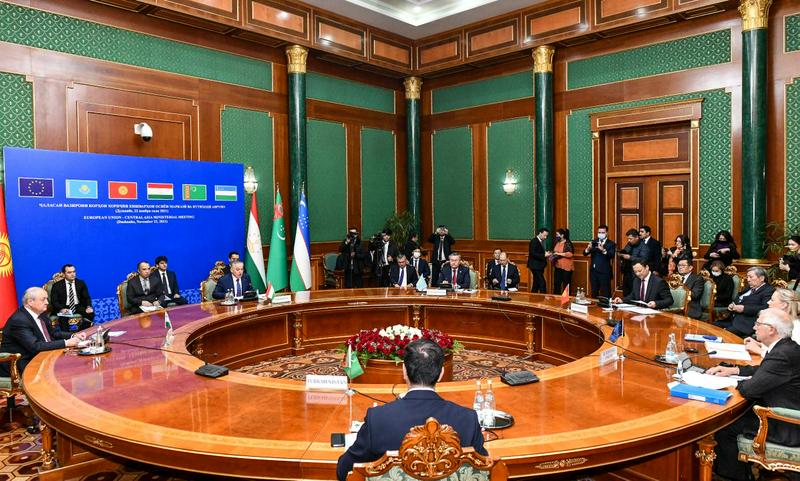Perizat RISBEK KIZI
Yesterday, Tajikistan hosted the 17th European Union (EU) –– Central Asia ministerial meeting. Meeting was co-chaired by the EU Representative for Foreign Affairs, Security Policy Josep Borrell, and Tajik Foreign Minister Sirojiddin Mukhriddin with the participation of the Foreign Ministers of Kazakhstan, Kyrgyzstan, Uzbekistan and the Deputy Foreign Minister of Turkmenistan.
The Ministry of Foreign Affairs of Tajikistan noted that the sides discussed topical issues of relations between the European Union and the countries of Central Asia, the prospects for expanding cooperation in the areas of trade, investment and the environment, as well as common security challenges.
Moreover, the crisis in Afghanistan took a special place on the agenda of the meeting. The negotiators noted that the intra-Afghan crisis requires the implementation of prompt and coordinated measures to prevent a humanitarian catastrophe in the country. Thus, the participants in the meeting expressed their hope for intensifying cooperation between the EU and Central Asia in the field of security and border control and reaffirmed their commitment to the establishment of an inclusive state in Afghanistan.
During the meeting, Josep Borrell said that the situation in Afghanistan requires a new approach to regional security. He also added: “Еhe EU can make a strong contribution to the future of the region if Central Asian states show determination in their commitment to reform and democracy.”
On the eve of this meeting in Dushanbe, the international organization Human Rights Watch called on the EU to put pressure on the governments of Central Asia to end human rights abuses and move on to constructive reforms. “Some Central Asian countries are playing an important part in the global response to the crisis unfolding in Afghanistan, but domestic human rights concerns are also central,” said Hugh Williamson, HRW director for Europe and Central Asia.
Activating the relationship between the EU and Central Asia
Recently, the relations of the European Union with the countries of Central Asia have received a new impetus. Thus, on November 5 of this year, the first economic forum “EU – Central Asia” was held in Bishkek, dedicated to the development of cooperation between regions in the areas of green economy, digitalization and improvement of the business environment. According to the European Commission, the forum aims to accelerate further diversification of Central Asian economies, stimulate trade, strengthen the rule of law and modernize the legal and regulatory framework.
During the 17th Ministerial meeting, Josep Borrell also presented to his Central Asian counterparts a plan for the upcoming EU Global Gateway initiative, a strategy of over € 40 billion in technology and infrastructure. EURACTIV writes that this strategy is seen by many as an attempt to respond to China’s Belt and Road Initiative. However, some EU diplomats contacted by the agency expressed doubts as to whether the bloc could compete with the financial might of Beijing and Moscow, while, unlike the EU, they do not ask for anything in return.
Additionally, in recent months, security and migration issues have dominated the public engagement of European leaders with Central Asia. In this context, on November 15, the EU announced that it would set up a focal point in Uzbekistan to distribute aid to Afghanistan. The United Nations Assistance Mission in Afghanistan (UNAMA) has temporarily relocated its headquarters to Almaty, Kazakhstan’s largest city.
Thus, as the Valdai Club notes, it is in the EU’s interest to have a stable, secure and prosperous Central Asia, because security concerns stemming from the crisis in Afghanistan have increased in the EU’s field of vision. In particular, the situation has caused alarm in European countries about the possibility of a new refugee crisis. However, according to the Club’s analysis, the EU’s security influence in Central Asia remains low because of Russia’s ınfluence.
Against this background, the Russian newspaper Komsomalskaya Pravda says that the confrontation between Russia and the West, which is deliberately pursuing a course of exacerbating relations, is growing. The EU’s activation in Central Asia is viewed in the context of the Western states’ plans to create “dividing lines” on Russia’s borders, and the formation of anti-Russian alliances. The newspaper emphasizes that with regard to Central Asia, a strategically important region for Russia, there is a need to activate the foreign policy, thus, emphasizing on the continuing “Great Game” in the region.

